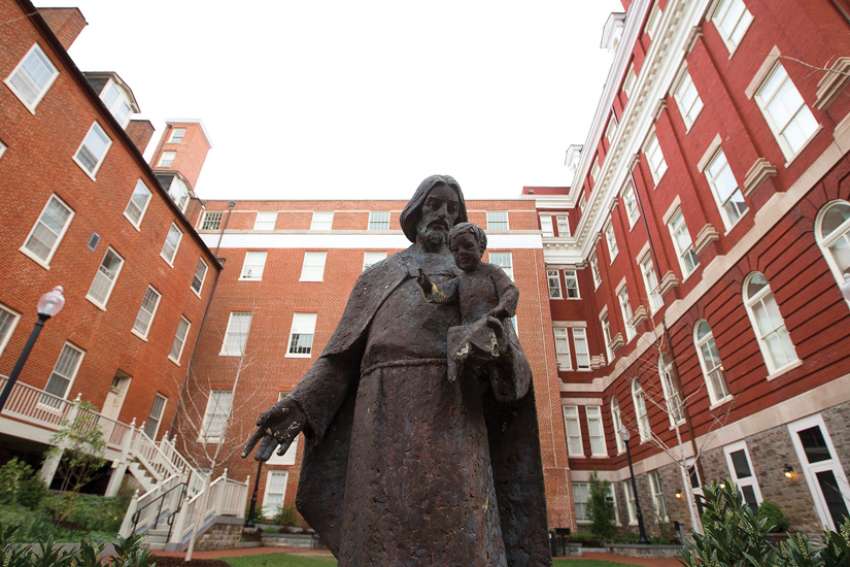Together with the GU272 Descendants Association, the American Jesuits have formed The Descendants Truth and Reconciliation Foundation. The GU272 Descendants Association represents over 10,000 descendants of 272 slaves the Jesuits sold to keep their college in Georgetown afloat in 1838. The new foundation has a long-term goal of raising $1 billion to fund racial reconciliation and community development in the U.S. The Jesuits have pledged to raise $100 million in the shorter term.
As the American Jesuits were figuring out how to go about reconciliation with descendants of people they once owned and profited from — they collected $115,000 from Louisiana plantation owners, the equivalent of about $3.3 million today — they’ve been in touch with Canada’s Jesuits to ask about their work of reconciliation with Indigenous Canadians. Native Canadians had their families, language and culture torn apart by residential schools, including the Jesuit-run school in Spanish, Ont.
The Canadian Jesuits issued an apology at one of the first Truth and Reconciliation Commission national events in Quebec City in 2013.
“(Fr.) Tim Kesicki, our conference president, he has a copy of that statement under the glass on his desk,” Canadian Jesuit Fr. Ted Penton, secretary of the Office of Justice and Ecology at the Jesuit Conference of Canada and the United States in Washington, D.C. told The Catholic Register. “The conference leadership here has been inspired by the work that has happened in Canada.”
The U.S. Jesuits have been on the phone and exchanging emails with Fr. Peter Bisson, assistant to the Jesuit Provincial of Canada for Indigenous Relations.
“Both the Jesuit slaveholding issues in the U.S. and the Jesuits’ roles in colonization and residential schools in Canada are reconciliation issues,” Bisson explained.
The Canadians aren’t claiming they’ve necessarily got it right, but the last decade of working on reconciliation has taught them that reconciliation requires partnership.
“We need the help of those who are still being wronged, and of the descendents of those who were first wronged, for our own decolonization,” said Bisson.
“The most hopeful sign, and the most humbling piece of this as a Jesuit living and working in the United States, is that the descendants of people who were enslaved by Jesuits in this country are wanting to join together with the Jesuits,” Penton said. “It’s this partnership element, the coming together.”
While a few headline writers in the U.S. have called the $100-million fundraising commitment “reparations,” that’s not a word the Descendants Truth and Reconciliation Foundation is using.
“We respect the right of all who are descendants of those enslaved in this country to pursue the dignity of their ancestors’ legacy in whatever way they choose,” reads a statement on the foundation’s website. “We have chosen to join hands with the descendants of the enslavers in a sincere process of truth, healing and reconciliation. We believe this is possible only through a sustained investment in the greater common good of future generations.”
The money the foundation raises will not go to individuals, but rather reconciliation projects at the community level.
Rather than limiting its scope to Jesuit slaveholding, the new partnership is concerned with the broader reality of racism in America.
“Systemic racism is very much a part of the present reality in the United States,” Penton said. “And it has its roots in the past, including past sins of the Society of Jesus.”
Understanding how the present is still enmeshed in the past is just the first step in reconciliation, said Bisson.
“We and the rest of Canada and the U.S. still benefit from what we took from Indigenous peoples and from enslaved persons,” Bisson wrote. “And, whether we realize it or not, we still carry greater or smaller vestiges of the old, colonizing mentalities.”
Neither truth nor reconciliation are minor diversions, bowing to political fashion, and the effort has nothing to do with wallowing in the past, Penton said.
“There could be a temptation sometimes to only want to look forward and say, ‘OK, that was too bad then, let’s just try to be better moving forward.’ But that’s a temptation that really leads down a false path, without really coming to terms with that sin within our history.”
Going all the way back to St. Ignatius and his companions, there’s nothing more Jesuit than reconciliation, Penton said.
“We really see the core mission of the Society of Jesus as being reconciliation with God and reconciliation with our fellow human beings and reconciliation with creation,” he said.

